|
|
|
Sort Order |
|
|
|
Items / Page
|
|
|
|
|
|
|
| Srl | Item |
| 1 |
ID:
152237
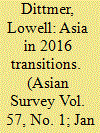

|
|
|
| 2 |
ID:
105679
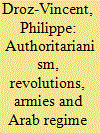

|
|
|
|
|
| Publication |
2011.
|
| Summary/Abstract |
Authoritarianism in the Arab world has had a propensity to endure for decades and was seen as an essential political feature in a region where democratisation was said to flounder. Yet, authoritarian regimes are exhausted and weakened. It took massive social mobilisation in 2011 in Tunisia and Egypt to topple them. Those societies have gained an essential voice in the political process with an aspiration for democracy. Transition was about to open up to chaos and then a specific actor, the military, stepped in to smooth the transition. The next step in Tunisia and Egypt is the delicate rebuilding of governments to fulfill this aspiration for democracy as well as to provide a demonstration effect for the new model of transition throughout the Arab world.
|
|
|
|
|
|
|
|
|
|
|
|
|
|
|
|
| 3 |
ID:
116695
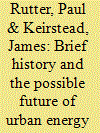

|
|
|
|
|
| Publication |
2012.
|
| Summary/Abstract |
Modern cities depend on energy systems to deliver a range of services such as heating, cooling, lighting, mobility, communications, and so on. This article examines how these urban energy systems came to be, tracing the major transitions from the earliest settlements through to today's fossil-fuelled cities. The underlying theme is "increasing efficiency under constraints" with each transition marked by increasing energy efficiency in service provision, increasing per capita energy use, increasing complexity in the energy system's structure, with innovations driven by a strategic view of the overall system, and accompanied by wider changes in technology and society. In developed countries, the future of urban energy systems is likely to continue many of these trends, with increased efficiency being driven by the constraints of climate change and rising fuel prices. Both supply and demand side technologies are discussed as potential solutions to these issues, with different impacts on the urban environment and its citizens. However in developing countries, rising urban populations and access to basic energy services will drive the next transition.
|
|
|
|
|
|
|
|
|
|
|
|
|
|
|
|
| 4 |
ID:
144328
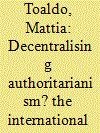

|
|
|
|
|
| Summary/Abstract |
In 2011, Libya became the only country of the Arab Uprisings where NATO and the Arab League intervened militarily, ostensibly to protect the civilian population, but in reality in support of the opposition National Transitional Council. This article argues that, since 2011, Libya has transitioned from Qadhafi’s centralised authoritarianism to a new decentralised authoritarianism where multiple centres of power coexist and sometimes overlap, while leaving room only for formal democratic institutions. This is the result of decisions taken by the ‘revolutionaries’ after the overthrow of the dictator, and a consequence of long-standing features of the Libyan state and society.
|
|
|
|
|
|
|
|
|
|
|
|
|
|
|
|
| 5 |
ID:
145990
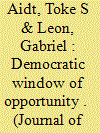

|
|
|
|
|
| Summary/Abstract |
We show that drought-induced changes in the intensity of riots lead to moves toward democracy in sub-Saharan Africa and that these changes are often a result of concessions made as a result of the riots. This provides evidence that low-intensity conflict can have a substantial short-run impact on democratic change and supports the “window of opportunity” hypothesis: droughts lead to an increase in the threat of conflict, and incumbents often respond by making democratic concessions.
|
|
|
|
|
|
|
|
|
|
|
|
|
|
|
|
| 6 |
ID:
075223
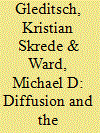

|
|
|
|
|
| Publication |
2006.
|
| Summary/Abstract |
Democracy does not evolve sui generis. The spatial clustering in democracy and transitions suggests that international factors play a prominent role in forging democracies as well as influencing their durability. We argue that democracy often comes about as a result of changes in the relative power of important actors and groups as well as their evaluations of particular institutions, both of which are often influenced by forces outside the country in question. The scope and extent of connections with other democratic countries in a region can strengthen support for democratic reform and help sustain institutions in transitional democracies. Results from a transition model demonstrate that international factors can exert a strong influence on the prospects for transitions to democracy, and the spatial clustering in democracy and transitions cannot adequately be explained by the hypothesized domestic social requisites of individual countries.
|
|
|
|
|
|
|
|
|
|
|
|
|
|
|
|
| 7 |
ID:
120122
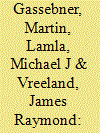

|
|
|
|
|
| Publication |
2013.
|
| Summary/Abstract |
What determines the emergence and survival of democracy? The authors apply extreme bounds analysis to test the robustness of fifty-nine factors proposed in the literature, evaluating over three million regressions with data from 165 countries from 1976 to 2002. The most robust determinants of the transition to democracy are gross domestic product (GDP) growth (a negative effect), past transitions (a positive effect), and Organisation for Economic Co-operation and Development membership (a positive effect). There is some evidence that fuel exporters and Muslim countries are less likely to see democracy emerge, although the latter finding is driven entirely by oil-producing Muslim countries. Regarding the survival of democracy, the most robust determinants are GDP per capita (a positive effect) and past transitions (a negative effect). There is some evidence that having a former military leader as the chief executive has a negative effect, while having other democracies as neighbors has a reinforcing effect.
|
|
|
|
|
|
|
|
|
|
|
|
|
|
|
|
| 8 |
ID:
120773


|
|
|
|
|
| Publication |
2013.
|
| Summary/Abstract |
Whereas optimists see the so-called Arab Spring as similar to the revolutions of 1989, and likely to bring about democratic rule, skeptics fear that protest bringing down dictators may simply give way to new dictatorships, as in the Iranian revolution. Existing research on transitions has largely neglected the role of protest and direct action in destabilizing autocracies and promoting democracy. We argue that protest and direct action can promote transitions in autocracies, and that the mode of direct action, that is, whether violent or nonviolent, has a major impact on the prospects for autocratic survival and democracy. We present empirical results supporting our claim that nonviolent protests substantially increase the likelihood of transitions to democracy, especially under favorable international environments, while violent direct action is less effective in undermining autocracies overall, and makes transitions to new autocracies relatively more likely.
|
|
|
|
|
|
|
|
|
|
|
|
|
|
|
|
| 9 |
ID:
098679
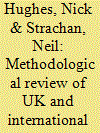

|
|
|
|
|
| Publication |
2010.
|
| Summary/Abstract |
Scenarios have a long history in business, politics and military planning, as a tool for strategic planning to inform protective, proactive or consensus-based decision making in the face of uncertain futures. Recent years have seen a growth in scenarios for assessing the implications of low carbon futures, but relatively little work has linked these energy scenarios to the broader literature on scenario development. This paper undertakes a methodological review of a selection of UK and international low carbon scenario studies, using a typology of 'trend based', 'technical feasibility' and 'modelling' studies. Dominant methodologies in such studies have been the 2×2 axis and the 'back-casting' approach. Strengths of the studies reviewed include technological detail, and identification of key economic and social constraints. Weaknesses include the over-reliance on constructs such as exogenous emissions constraints, and high level trends, which diminish the ability to understand how the various future scenarios could be brought about or avoided. This is compounded by the lack of depiction of specific system actors; the tendency to abstract policy from the scenarios; and the resulting failure to consider policy, technology and behaviour in an iterative, 'co-evolving' fashion.
|
|
|
|
|
|
|
|
|
|
|
|
|
|
|
|
| 10 |
ID:
173126
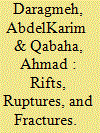

|
|
|
|
|
| Summary/Abstract |
This article responds to the relative neglect of reading Mahmoud Darwish from a postmodern perspective. Inspired by postmodern theory, we suggest that Darwish after Oslo agreements in 1993 seeks to have a displaced and dialectical encounter with the collective identity; he utilizes a transition from being into becoming, from filiation into affiliation, knowing that this transition mirrors rifts, ruptures, and fractures in the Palestinian historical and geopolitical conditions in the post-Oslo era. By looking at poems written after the Oslo Accords, which were described by Bashir Abu-Manneh as “the root cause of the disintegration and liquidation of Palestinian agency,” we argue that Darwish's persona manifests the postmodern intellectual who is tempted to leave the collective and expatriate himself to hone an independent self and thought that provides a fresh perspective and a new understanding of Palestinian collectivity. While Darwish's pre-Oslo poetry expressed a collective voice, identification, and commitment to the national narrative, after Oslo, he gets more personal and, perhaps, detached from and critical of the nationalist political entities and narratives. Building on theoretical insights from both postcolonial and postmodern intellectuals, we also articulate ways in which the dialectical relation between postcolonialism and postmodernism appears in Darwish's poetry. We find that the persona at times combines, and at other times, fluctuates between, singularity and multiplicity, certainty and suspicion, the collective and the personal, place and space, tradition and innovation, while seeking revision, transition, contingency, dynamism, fluidity in the contemporary, post-Oslo time.
|
|
|
|
|
|
|
|
|
|
|
|
|
|
|
|
| 11 |
ID:
122735
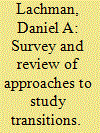

|
|
|
|
|
| Publication |
2013.
|
| Summary/Abstract |
With the aim to achieve a sustainable future, the field of transition studies has recently received increasing attention. Transition thinking and transition management have even been provided with a prominent spot in strategies and policies of a growing number of countries. However, though various approaches to study transitions (in particular, sustainability transitions) have been discussed and used in the past, an overview of these - with their advantages and disadvantages - has not been provided yet. Furthermore, linkages between these approaches have also not been provided in a single overview.
This article fills that gap in literature on transitions. It starts with the emergence of the "transition" concept and follows it to the notion of "sustainability transitions". Next, the article reviews approaches to study transitions. Thereafter, the paper provides some general criticism as well as strengths and contributions from transition research approaches to provide an impetus towards further research in this field.
|
|
|
|
|
|
|
|
|
|
|
|
|
|
|
|
| 12 |
ID:
140330


|
|
|
|
|
| Summary/Abstract |
This article uses the Country Indicators for Foreign Policy (CIFP) fragile states framework to evaluate fragile state transitions. Our objective is to find out why some states considered fragile have recovered, while others remain fragile for long periods. We identify three categories of countries: those in a fragility trap, those that have exited it, and those that fluctuate between fragility and stability. CIFP data are used to examine state transitions for each category. One state from each category is then subjected to further country-level analysis. Our findings reinforce the view that state transitions do not follow a unique path and that effective engagement in fragile states requires different approaches across cases.
|
|
|
|
|
|
|
|
|
|
|
|
|
|
|
|
| 13 |
ID:
159160
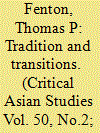

|
|
|
| 14 |
ID:
147664
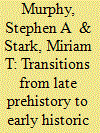

|
|
|
|
|
| Summary/Abstract |
Studies of early Southeast Asia focus largely on its ‘classical states’, when rulers and their entourages from Sukhothai and Ayutthaya (Thailand), Angkor (Cambodia), Bagan (Myanmar), Champa and Dai Viet (Vietnam) clashed, conquered, and intermarried one another over an approximately six-century-long quest for legitimacy and political control. Scholarship on Southeast Asia has long held that such transformations were largely a response to outside intervention and external events, or at least that these occurred in interaction with a broader world system in which Southeast Asians played key roles. As research gathered pace on the prehistory of the region over the past five decades or so, it has become increasingly clear that indigenous Southeast Asian cultures grew in sophistication and complexity over the Iron Age in particular. This has led archaeologists to propose much greater agency in regard to the selective adaptation of incoming Indic beliefs and practices than was previously assumed under early scholarship of the nineteenth and early to mid-twentieth century.
|
|
|
|
|
|
|
|
|
|
|
|
|
|
|
|
| 15 |
ID:
188706


|
|
|
|
|
| Summary/Abstract |
While divided cities are characterized by spatially cemented segregation and polarized divisions, the trembling city is organized around transient and transformative borders. We conceptualize this notion of urban space to capture Freetown’s war-peace transition in the late 1990s and early 2000s. Ex-combatants settled on the city margins, bringing with them spatial strategies from war-fighting into the city by recreating a system of bases. The Sierra Leone Police (SLP) re-emerged with external support, seeking to compartmentalize and fixate Freetown through a combination of force and negotiation. We use borders and bordering to understand policing as attempts by both ex-combatants and the SLP to border in as well as out; defensively against external interference and offensively to make territorial claims. By extension, it is tensions in these practices between attempts to defend and harden borders, and at the same time, expand and soften them that trigger a tremble. The city tremble was a reminder of the possibility of war that Freetown very easily could return to. It also became a more general and inconspicuous condition of the city as an inhabited space, where multiple and often incompatible and conflictual spatial logics, strategies, and practices of policing clashed, overlapped and co-existed uneasily.
|
|
|
|
|
|
|
|
|
|
|
|
|
|
|
|
|
|
|
|
|